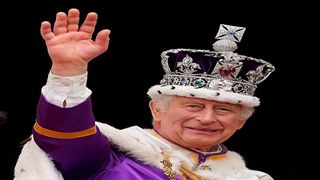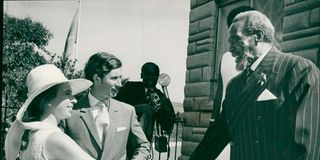
Britain's King Charles III wearing the Imperial State Crown, waves from the Buckingham Palace balcony after viewing the Royal Air Force fly-past in central London on May 6, 2023, after his coronation.
| Stefan Rousseau | POOL | AFPNews
Premium
King returns to Mau Mau land: Will he apologise for colonial atrocities?
When King Charles III visits the country on Tuesday, the question that will be lingering will be whether Britain will finally apologise for the colonial atrocities that happened from the 1890s as it expanded its empire towards Africa. What he chooses to do will be his legacy.
In recent years, Britain has been pressured to issue formal apologies – rather than hide behind the “we-deeply-regret” mantra. In 2019, it refused to apologise over India’s Amristar massacre of 1919 when British troops shot at protesters demanding the end of colonial rule.
Ten years ago, British Foreign Secretary William Hague expressed “sincere regret” for crimes committed by imperial officers during the 1950s State of Emergency in Kenya, which was partly declared to forestall the push towards independence.
In April, the British Prime Minister refused to apologise over the slave trade, continuing a tradition where top leadership has expressed “sorrow” or “deep regret” over colonial and other atrocities.
As part of his Kenyan visit – the first in Africa ever since he took the throne from his mother, Queen Elizabeth II – King Charles III will be under the same pressure.
He will be taken to Uhuru Gardens, which, though it’s a site of Kenya’s independence, it was the place where British torture on innocent Kenyans took place in April 1954 as it launched Operation Anvil, which left thousands of men, women and children caged behind barbed wires as London fought to retain its most important settler-colony in Africa.
Historians have likened Lang’ata and other holding sites to a British Gulag.
Lang’ata is a site of pain, triumph, and memory. The construction of a museum at the site – with the tomb of the unknown soldier – was a significant development in how Kenya wanted to remember its history.

Prince Charles with President Jomo Kenyatta in Gatundu, Kiambu, on February 17, 1971.
When he opened the museum, former President Uhuru Kenyatta acknowledged that Kenya’s freedom was the result of an armed struggle. “We will forgive them, but never forget,” he said of the British.
“This place will rekindle memories of our armed struggle, but also the good, the bad and the ugly of our history,” said Kenyatta. If King Charles visits the museum, as expected, how he handles that part of history and the words he chooses will determine how Commonwealth countries will continue to relate to the former metropole.
And more importantly, how Britain intends to confront its history during King Charles’s reign. For the royal family, Kenya is an important site. It was at the Treetops Hotel in Nyeri that Charles’s mother – Queen Elizabeth II – learned of her father’s death and took over the reins.
Ever since, Kenya’s history was weaved within the royal family’s, and has continuously attracted its members for private and official visits. The expected visit to Lang’ata is of importance.
At the Lang’ata site (named Uhuru Gardens), Jomo Kenyatta received instruments of independence from the Duke of Edinburg who was representing the Queen. Kenya, which became the 34th African state to get freedom, was to be a test case on how it would treat the minority white settlers and Asians.
Never before had an African government taken over power where the population of whites was as large. While the ceremony ended Kenya’s 68 years as a British protectorate and colony, it also opened some new relations with no radical break.
Some historians and commentators regard cordial relations as part of neo-colonial continuity schemes. The visit will be a stamp of approval for President William Ruto, and will take place some 40 years after President Moi welcomed Queen Elizabeth in her first state visit to Kenya.
The Queen had made two stop-over visits in 1971 and had a luncheon with Kenyatta at State House, Nairobi. But it was President Moi who would win more favours from Britain.
Shortly after Moi took power, records indicate that British officials recognised him as an ally. In a brief to the Queen, Moi was described as a “sincere, intelligent but rather modest man”. According to historian Poppy Cullen “this second quality is particularly interesting given earlier views of Moi as unintelligent”.

Britain's Queen Camilla (R) and Britain's King Charles III (L).
The Daily Telegraph had also described Moi as “‘rated by many as one of Africa’s most successful leaders … (and as) one of the great surprises of the post-colonial era in Africa”. Moi was then looking for aid, and London was seeking Kenya’s support over Rhodesia – the last of British settler colonies.
Queen Elizabeth first visited Kenya in 1972 in what was seen as an attempt to help erase the bitter past after she had watched Kenya go through its most painful period in history while she was in power. Ironically, she was hosted by the prisoner that Governor Patrick Renison had in 1960 dismissed as “leader unto darkness and death”.
While she had last visited Kenya when it was still a settler colony in 1952 – a tour disrupted by her father, King George VII’s death – the 1972 meeting was like testing the waters of the relationships. Ahead of her visit in 1972, Prince Charles and Princess Anne had visited Kenya and met with Jomo Kenyatta at State House, Nakuru.
“I have always longed to come and Kenya seems the most sensible and best place to come. There are masses of game to see here,” he told the press.
Prince Charles’s visit appeared to have done some miracles: During a meeting with Kenyatta, the Queen is said to have laughed out loud after Kenyatta complimented her for bringing up “charming and refreshing” children in reference to Charles: “They reminded us that things at the Court of St James are human, too, … and you are not immune from the challenges of parenthood. But your case they have been well met,” Kenyatta said.
But the 1971 visit was almost marred by several Asian protesters carrying placards and protesting Britain’s immigration laws, which discriminated against the Asians leaving Kenya. While the protesters were ordered to leave the International Embakasi Airport minutes before the prince landed, it was an indicator of how history followed the royal family wherever they went.
King Charles III could have easily avoided such disruption when he was a prince. During the Queen’s silver jubilee in 1977, Charles visited Kenya amidst rumours that a blonde accompanied him.
One of his biographers later recounted: “As he watched a bevy of beautiful flamingos flutter past him on Kenya’s Lake Nakuru, Charles laughed at photographers, “You have caught me with plenty of birds this time – isn’t it a pity that they are only the feathered variety?” Charles was reportedly amused by the gossip spread by British tabloids on a mystery blonde: “If you read the British newspapers, the bush was thick with the other kind of birds when I was on safari.”
The British High Commission in Nairobi could only confirm his presence and gave no further details. Kenya was a space for royal retreat, and such visits were seen to boost the image of a tourist destination. In 1977, Charles was again in Kenya for a private visit with the press following him to conform the identity of “woman camping companion”.
In 1978, he was back in Nairobi to attend Jomo Kenyatta’s funeral, which the British government partly organised. It was during this period that he caught the attention of the media after he snubbed Ugandan President Idi Amin, then accused of atrocities and human rights abuse.
While Amin took a seat two places from Charles, the two ignored each other throughout the funeral. But Charles had taken one of the bullies of Africa.
While Kenyatta did not reciprocate with a visit to London after he became president, the royal family could occasionally send their members for royal safaris or as part of solidifying the relationships between the two countries.
Kenya had significant British investments, and it was felt in London that the country is strategically important. The country had also entered into military agreements and armament programmes though this slowed down during Kenyatta’s reign.
By the time Moi took power, he was seeking £30 million. King Charles III is arriving at a period that Kenya’s economy is struggling and when Western currencies have battered the shilling. His visit is, however, a plus for tourism.
Perhaps important is that with Ruto, playing the pan-African card, Britain has seen a personality who could her advance a broader African policy. Already, Ruto is being courted by the Americans and has reshaped Kenya’s foreign policy to suit US interests.
With King Charles’s visit in the first years of his presidency, Ruto may have a much greater voice within the Commonwealth. UK interests in Kenya have been under attack, especially in Ruto’s Rift Valley backyard, where British-owned tea estates are pressured to relinquish 100 per cent ownership. More so, there have been murmurs about the British soldiers training in Kenya – and how they have negatively impacted the communities.
British Army Training Unit Kenya members have been accused of sexual abuse, murder, and leaving unexploded ordinances in parts of their training grounds.
Moreover, Kenyans have argued that the more than 200 military personnel have enjoyed impunity since 1963. King Charles may not address the politics. He may not apologise. But behind the scenes, these issues will remain away from his interests in wildlife and technology.





